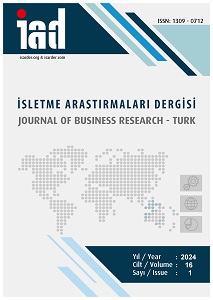Kariyerizm Algısının İşe Adanmışlık Düzeylerine Etkisi: Otel İşletmeleri Çalışanları Üzerine Bir Araştırma
The Impact of Perceived Careerism on Levels of Job Commitment: A Study among Employees in the Hotel Industry
Author(s): Elif Söylemez, Gamze Eryılmaz, Hasan CİNNİOĞLUSubject(s): Business Economy / Management, Labor relations, Socio-Economic Research
Published by: Orhan Sağçolak
Keywords: Careerism; Work-Job Engagement; Emotional Engagement; Physical Engagement; Cognitive Engagement;
Summary/Abstract: Purpose – The main purpose of this study is to examine the effect of careerism perception, which is a negative employee tendency, on employees' level of job commitment. Since negative organizational behaviors in the organization negatively affect job performance and organizational unity, the effect of careerism tendency on employees' level of job commitment is important. Design/methodology/approach - In line with this purpose, survey data were collected from 204 employees working in 5-star hotel establishments operating in Istanbul. While the population of the research consists of 5-star hotels serving in Istanbul, the employees in these hotel establishments constitute the sample of the research. Participants were selected by simple random sampling method. The analysis of the data obtained was carried out with the SPSS program. Findings – As a result of the research, it was concluded that careerism tendency has a significant and negative effect on work engagement and has a significant and negative effect on emotional engagement, which is a sub-dimension of work engagement. It was concluded that there was no significant effect on the other sub-dimensions of physical and cognitive commitment. Discussion – According to the results of the study, careerism tendencies of hotel employees negatively affect their level of work engagement. In addition, when the relationships with the sub-dimensions of work engagement were examined, it was concluded that careerism tendency has a negative relationship with the emotional commitment dimension. It can be said that employees' emotional attachment to their jobs and focusing more on their jobs will negatively affect their careerism tendency. As a result of this research, it can be said that the relationship between employees' careerism tendency and their physical and cognitive commitment to work is not significant or cannot be related. It is assumed that preventing careerism tendency from negatively affecting other positive organizational behaviors and increasing employees' commitment to work is possible with the right leadership style of managers and the awareness of the Human Resources department. For this purpose, the relationship between leadership styles and careerism can be evaluated in future research.
Journal: İşletme Araştırmaları Dergisi
- Issue Year: 16/2024
- Issue No: 1
- Page Range: 275-292
- Page Count: 18
- Language: Turkish

